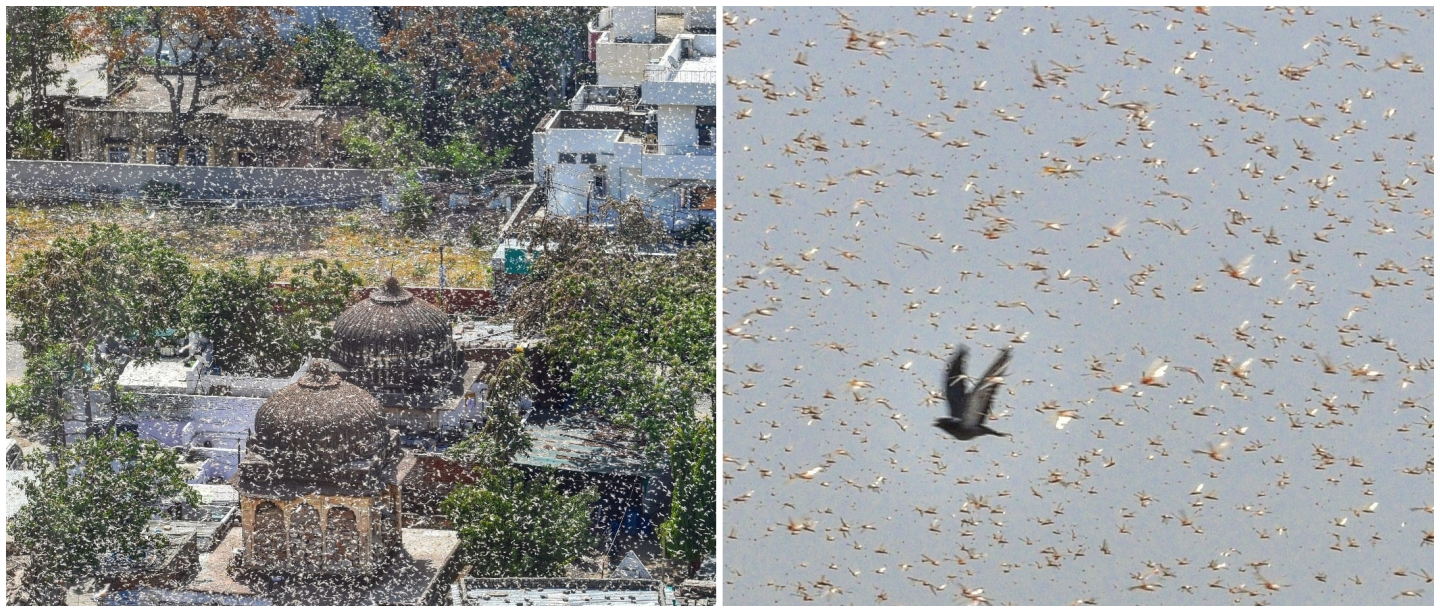We are living in the middle of a global health crisis. The novel coronavirus has infected 5.5 million people across the world and 346k people have died due to the fatal virus. Out of these, 145k cases have been confirmed in India and 4,167 people have lost the battle to COVID-19. Life as we know it has come to a grinding halt ever since the pandemic left the world struggling to contain the rapidly spreading virus. Just when we were beginning to adjust to a new way of life under lockdown, a crushing cyclone ravaged Kolkata, parts of West Bengal and Orissa. And now an unprecedented number of fires have devastated huge swathes of forest in Uttarakhand.
It’s only been five months into the year and it has already seen its fair share of historic events. And it doesn’t seem to be ending. Now, we do concur with the idea that the year 2020 is the ultimate devil. Because just yesterday large swarms of locusts on Monday overran several residential localities of Jaipur.
In Pictures: Locust Attack That Can Despoil India
2020, what's more to see? 😭😭😭😱😱😱#LocustAttack #Jaipur pic.twitter.com/mkRfm4WSbH
— Rupali (@KrazyGal92) May 25, 2020

Locusts, which are part of the grasshopper family, are considered the most destructive migratory pest in the world, and a single swarm covering one square kilometre can contain up to 80 million locusts.
Speaking about the damage locusts have been causing, BR Karwa, deputy director at the Agriculture Department said in a media statement, “Since the last one year, locust swarms have resulted in serious losses for farmers. We believe this time the swarms came all the way to Jaipur because the locusts couldn’t find any crop to consume—most of the crop has already been harvested.”
According to The Food and Agriculture Organisation (FAO), UN, an international agency that monitors and manages locust invasions, a swarm of locusts can eat the same amount of food in one day as 35,000 people.
These locusts crossed Pakistan and then entered India through Rajasthan. And now these crop-devouring insects have invaded eastern Maharashtra attacking at least four to five villages.
Swarms of #Locusts in #Jaipur ……the commentary is surely 'entertaining' and even goes to mention #Pakistan ka टिड्डी दल (locusts swarms) 🤐🤐#LocustAttack #lockdownindia pic.twitter.com/PwzLSMBhlH
— Virat A Singh (@tweetsvirat) May 25, 2020
Is these the starting of End of the World
In Jaipur and other parts of Rajasthan and Madhya Pradesh that locust attacks have started.
For an uninitiated locust attack, a 1 km swarm can destroy standing crops that can feed 35000 people in a single day.#LocustAttack pic.twitter.com/JUaLj8MD0H— Ronnie Basumatary Das (@RonnieBasuDas23) May 25, 2020
Is these the starting of End of the World
In Jaipur and other parts of Rajasthan and Madhya Pradesh that locust attacks have started.
For an uninitiated locust attack, a 1 km swarm can destroy standing crops that can feed 35000 people in a single day.#LocustAttack pic.twitter.com/JUaLj8MD0H— Ronnie Basumatary Das (@RonnieBasuDas23) May 25, 2020
To tackle the locust invasion, the Rajasthan government has approached DGCA as the insects are flying at a height greater than their basic natures. The government is considering drones and specialist equipment to monitor the movement of locusts and spray insecticides to ward off this new outbreak.
According to a government official in a statement given to ETTech, “This is unprecedented for India since it’s the first time we’ve allowed drones to carry payloads in a civilian use case, or spray any pesticides for that matter. There have been some trials for crop spraying using drones, but those were strictly restricted to specific zones. In this exemption, the agriculture ministry can fly drones anywhere.”
#LocustAttack in RLBCAU, Jhansi
too deadly for crop… It finishes every thing that lies in its path.. pic.twitter.com/Joh4klh6Ib— Dr. Sanjeev #संजीवनी #stay@🏡 (@sanjeevagri) May 22, 2020
So now there's a locust attack when our supply chains were already so constrained and disrupted by Covid19.
2020 give us a break. #LocustAttack #locust pic.twitter.com/KFfrltRleU— Richa Nahata (@NahataRicha) May 25, 2020
When you don’t stay home,
Someone finds another way to keep you home
Btw ye Pakistan se aai hai 😉
#LocustAttack #lockdownindia #LocustInvasion pic.twitter.com/9sy8cjANmn— Mee'nal Maharwal (@tennis_meenal) May 26, 2020
While the visuals we have been seeing all over the internet are chilling, these attacks also pose a serious threat to India’s agriculture this year as the insects devour on crops and livelihoods of farmers. We are praying for them.
Featured Image: Instagram



